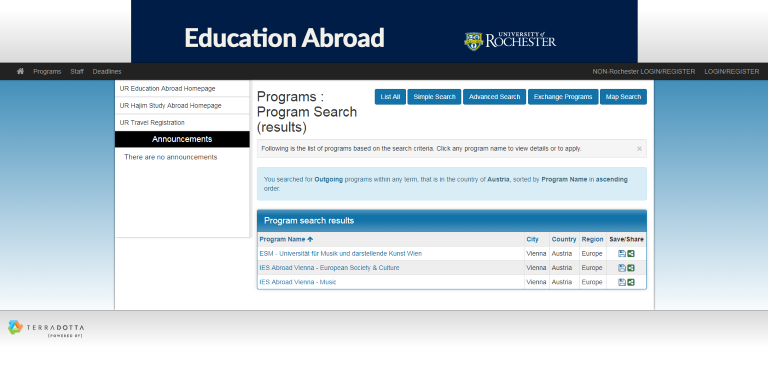The Conservatory Exchange Program expands opportunities for Eastman students by creating student exchanges with leading International music conservatories. A semester or year abroad offers the chance to improve language skills, appreciate a different culture, find a unique educational experience, learn about national performing styles, complete important research, and/or seek career opportunities.
Applications for the Conservatory Exchange Program are due by March 1 of the preceding academic year.
Eastman students participating in an exchange pay tuition and receive financial aid through Eastman, and receive tuition-free study at a cooperating conservatory. Living and travel expenses, as well as other costs and/or fees, are borne by the student.
Undergraduate students who may be interested in a year or semester abroad are urged to plan their course schedule several semesters into the future in order to fit study abroad into their curriculum. Ideally, students will study abroad during their junior year. Master’s or doctoral students may use the exchange program to extend their degree studies by a semester or a year, as they are required to complete the minimum number of semesters in residence at Eastman.
Eastman students should apply for the Conservatory Exchange program through the UR Study Abroad Portal. Information materials, application form, and recommendation forms are all coordinated through this system. Questions about the application process can be directed to the Office of Academic Affairs at AcademicAffairs@esm.rochester.edu.
Eastman students also have the option of participating in programs offered by the University of Rochester’s Study Abroad Office, although these programs are not always directly relevant to a musical education. IES (the Institute for the International Education of Students, www.iesabroad.org) offers music-based study programs in London, Milan, Paris, and Vienna. The Milan program in particular offers instruction at several conservatories, including the Accademia Musical G. Marziale, the Civica Scuola di Musica, and the Conservatorio G. Verdi. IES also offers opportunities for non-musical study in additional locations. Application to IES programs is made directly to IES (an independent organization) or the University of Rochester’s Study Abroad office, with support from Eastman in securing the best possible teacher.
Applications require:
- Application form with personal statement
- Letter of recommendation (studio teacher)
- Letter of recommendation (foreign language evaluation)
- Transcripts – Make a request via the ESM Registrar’s Office. State that it’s for a Conservatory Exchange application.
- Recording – Provide the URL to an audio or video recording for review. The link can be to a private YouTube or Vimeo video, a Dropbox file, or through any other standard file-sharing service. The recording should be no more than 10 minutes in length and include at least two contrasting musical selections.
ALL portions of the application must be submitted through the online portal by the March 1st deadline.
Applications are available through an online portal and all pieces of the application need to be uploaded via this method. You can find your program and submit an application here.
You can identify your program using the search feature. Select Advanced Search and then select the country of your program. In the results, an Eastman Conservatory Exchange program will be listed with the prefix “ESM” followed by the name of the school. Please see the image below for an example. Questions or issues with the online application can be directed to academicaffairs@esm.rochester.edu.

“My semester abroad studying music pedagogy in Freiburg was an incredible experience. Not only did I gain perspective on all of my training that I received at Eastman, but I got many chances to share my methods and ideas with my colleagues and professors in Germany. Being completely immersed in the language and culture challenged me, while the cross cultural bond classical music creates gave me an immediate sense of comfort. At school, I participated in small seminar classes dealing philosophical aspects of pedagogy, took conducting lessons and worked with an orchestra, played chamber music, and collaborated with composers. Outside of school, I spent time observing music instruction in a Kindergarten and participating in an outreach project with a high school music class and the Freiberger Barockorchester. I came away from the semester with a meaningful understanding of German concepts of Music Education in a classroom setting and how these ideas are put into practice. Naturally, my language improved immensely and I learned a wealth of classical music specific vocabulary that I could not have learned in a language classroom. Living abroad brings so much to one’s art, and I’d encourage everyone to seek these types of opportunities.” – Bridget Kinneary
